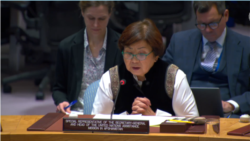A top United Nations official has called for more frequent and direct engagements with de facto Taliban authorities both inside and outside Afghanistan to address the country’s challenging relations with the international community.
Addressing members of the U.N. Security Council on Wednesday, Roza Otunbayeva, the secretary-general’s special representative for Afghanistan, said engagement does not equate to legitimizing Taliban rule.
“It can be used to express disapproval yet encourage change,” said Otunbayeva, adding that the U.N. Assistance Mission in Afghanistan has had “successful interactions” with Taliban authorities on several issues, including counternarcotics and human rights.
Otunbayeva's plea for increased engagement comes just days after a U.N. credentialing committee rejected for a third consecutive year the Taliban's attempt to secure Afghanistan's U.N. seat.
Despite having governed Afghanistan for over two years, the Taliban regime remains unrecognized by any country, and several of its key leaders, including the foreign minister, are subject to travel sanctions.
The Taliban's limitations on women's education and employment, coupled with their reluctance to establish an inclusive government, are highlighted as key factors contributing to the regime's isolation.
Otunbayeva also urged Taliban leaders to change their discriminatory policies and adhere to the international treaties and conventions that Afghanistan has signed.
To help Afghanistan return to the international arena, Otunbayeva said, compromises will be required from all sides.
Robert Wood, a U.S. representative to the U.N., urged Security Council members “to work together to press the Taliban to reverse their destructive course.”
“The Taliban must engage in serious dialogue with the Afghan people to support their aspirations, to put an end to human rights abuses, and to allow assistance to reach those in need,” Wood said.
Special envoy
In April, U.N. Secretary-General Antonio Guterres appointed Turkish diplomat Feridun Sinirlioglu to conduct an independent assessment and recommend how the Security Council should engage with the Taliban.
Among the recommendations Sinirlioglu made in a report submitted last month was the appointment of a special envoy to lead international diplomacy with the Taliban. The Taliban, however, opposed such an appointment.
“The de facto foreign minister explained that the long history of U.N. special envoys in Afghanistan was not positive,” Otunbayeva said.
In 2001, the Taliban were excluded from a U.N.-led intra-Afghan conference in Germany, which laid the groundwork for the post-Taliban Afghan government. An earlier U.N. plan for transitional arrangements in Afghanistan in 1992, led by U.N. special envoy Benon Sevan, did not succeed, leading to factional fighting across much of the country.
Wood voiced support for the appointment of a special envoy for Afghanistan, describing the move as “important for the development of a road map that ensures Afghanistan meets its international obligations.”
Addressing the Security Council meeting on Wednesday, the Chinese representative, Geng Shuang, stressed that the Taliban must shape the current political reality in Afghanistan.
“When engaging with the Afghan authorities, the international community needs to demonstrate good faith, set no preconditions, communicate with the Afghan Taliban in ways easily acceptable to it, and strive for its understanding and cooperation,” Geng said.
China and Russia, two of the five permanent members of the Security Council, have maintained diplomatic and trade relations with the Taliban. Chinese companies have also entered into oil and mineral mining contracts with the de facto government.




